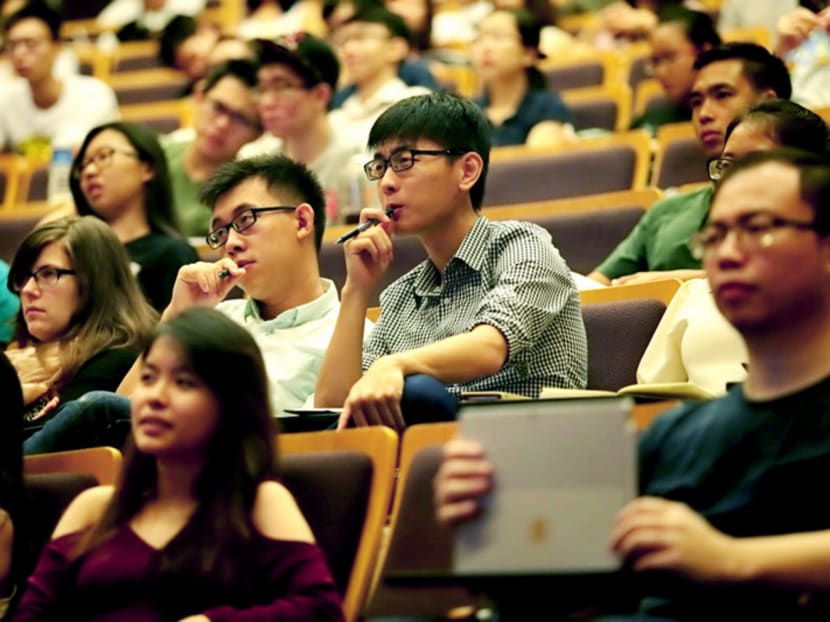Prime areas eyed for public flats, to make city ‘accessible to all’
SINGAPORE — The Government is looking into building public flats in prime areas, such as the planned Greater Southern Waterfront, to ensure that the city is “accessible” to all, said National Development Minister Lawrence Wong during a forum with National University of Singapore (NUS) students yesterday.

National Development Minister Lawrence Wong delivered the keynote address and engaged students in a Q&A session at the Kent Ridge Ministerial Forum. Other topics raised by students include how to bring together the various groups of Singaporeans with their different ideologies. Photo: Nuria Ling
SINGAPORE — The Government is looking into building public flats in prime areas, such as the planned Greater Southern Waterfront, to ensure that the city is “accessible” to all, said National Development Minister Lawrence Wong during a forum with National University of Singapore (NUS) students yesterday.
Such flats could have different requirements such as varying lease periods, said Mr Wong, as he responded to a question from a student on how to make public buildings and new economic icons available to all Singaporeans. The student had pointed out that although Marina Bay Sands, for example, is an icon of Singapore, “it is not really a place for all Singaporeans because of the high cost of enjoying such a place”.
Mr Wong was addressing some 170 students at the annual Kent Ridge Ministerial Forum, during which he also touched on other issues, such as addressing fault lines in society and the need to maintain social mobility.
Noting that there are common areas and green spaces within areas such as Marina Bay that Singaporeans can enjoy for free, Mr Wong said: “That has always been the basis of building our city, that it cannot be stratified, we don’t want a city that is exclusive. You cannot have a person living in a three-room flat or an HDB flat saying: ‘This is not accessible to me, this is a city that’s only for the elites, and it’s not for me’.”
In planning Singapore’s new “Central Business Districts” in Jurong or the Greater Southern Waterfront extension, the Government will be “very mindful and conscious of this — be it having a hawker centre there, having gardens and parks, or even having HDB flats there — so that you have HDB residential living right in the city”, he said.
The idea of building more public housing in prime areas to increase interaction between the haves and have-nots had been floated last year at a Real Estate Developers’ Association of Singapore event. Then, Mr Chan Chun Sing, who was Social and Family Development Minister, said simply doing that would not bridge the rich-poor divide.
Earlier last year, a paper published by the Lee Kuan Yew School of Public Policy had also raised the question of whether less public housing being built in Singapore’s city centre could lead to “enclaves” of wealth and social stratification.
Yesterday, Mr Wong acknowledged the difficulties of building public flats in prime areas. “People who successfully ballot for highly subsidised flats in the city area would have a ‘huge gain’”, he said, adding equity also had to be ensured for those who do not get the flats.
The Government does not have a good solution yet, but different options are being thought through, he added. But “the basic imperative to make sure our city is accessible by everyone, is something that we fully agree” with, he said.
Before the question-and-answer segment of the forum, Mr Wong also spoke on future developments in Singapore. Commenting on the planned Tengah town, envisioned as a “forest town”, Mr Wong revealed that a green corridor would link residents to the western and central catchments. The first batch of flats will be sold from 2018 onwards, he added.
Other topics raised by students include how to reconcile different groups of Singaporeans with different ideologies, including very “emotional” issues such as homosexuality, and rising anti-globalisation sentiments.
On reconciling fault lines, Mr Wong said such fault lines, which span race and religion, and sexuality issues, exist everywhere. “Attitudes on sexuality will evolve. Let them evolve naturally, because if you push too hard, it will create more tension, more pushback, and it may be counter productive,” he said.
On anti-globlisation sentiments, Mr Wong noted that countries have tried to uphold the international order, and push for trade and inter-dependency among economies, such as supporting the Trans-Pacific Partnership.
As the economy slows, Singapore will not be immune to such sentiment if unemployment rises and wage growth slows. “Things may not go the right way, we have to be nimble and keep watch on the external environment ... within Singapore, we can make sure we look after those with lower incomes, the vulnerable ... and make sure we have social mobility.”






